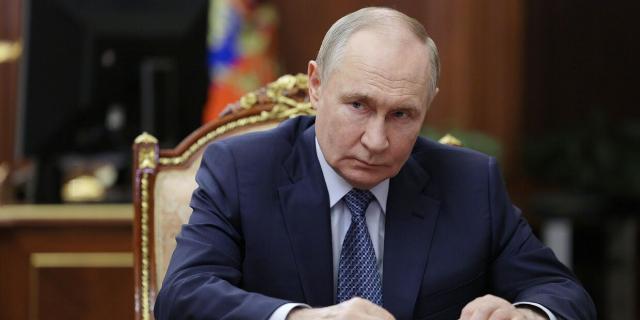NYT: Putin ordered Russian representatives to take a hard line with the United States
Putin considers direct talks with Trump to be a necessary condition for achieving his ultimate goals in Ukraine, the NYT writes. At the same time, he may make concessions on the issue of annexation of territories, experts admit.
Paul Sonn
Anton Troyanovsky
President Vladimir Putin has long expressed a desire to meet with President Trump.
And here's why: he is convinced that such a meeting, and not just advancing on the battlefield, is his best chance to win in Ukraine.
Analysts who closely study Putin's activities, as well as people who know him personally, have argued since the first days of the conflict that the Russian leader's main goal is primarily to conclude a long—term peace agreement in order to achieve his geopolitical goals, rather than to conquer a certain territory by military means.
And it is the president of the United States, they explain, who is the necessary person for this, who can, among other things, close Ukraine's path to NATO and prevent further expansion of the alliance. This explains why Putin is so diligent in appeasing Trump and trying to prevent a final break with Washington, even though he is increasingly angry at the Russian leader for refusing to cease fire.
“Putin wants to keep Trump as a resource for a possible transition to peace," said Sergei Markov, a pro—Kremlin political analyst from Moscow. "Trump is needed to achieve Russian conditions.”
“Indeed, based on today's realities, it would be better for us to meet and calmly discuss all areas of interest to the United States and Russia. We are ready,” Putin said in January.
On Thursday morning, the Kremlin confirmed that Putin and Trump plan to meet in the coming days, but did not give an exact date.
The Trump administration postponed the meeting, waiting for signals from the Kremlin that Putin was really serious about a real cease-fire.
The sudden decision by the White House to hold a meeting caused a wave of speculation about what Putin had agreed on Wednesday in Moscow during talks with Trump's special envoy Steve Witkoff, assuming that agreements had been reached in principle.
It is unclear what exactly became the topic of discussion. The Kremlin's top foreign policy aide, Yuri Ushakov, said that Putin had given Witkoff certain “signals” about Ukraine, but did not go into details.
One option is that Putin has demonstrated greater flexibility on the issue of dividing or exchanging territories as part of a peaceful settlement with Ukraine.
In recent months, Russian envoys in negotiations with their American counterparts have insisted on recognizing Moscow's sovereignty over all four regions that the Kremlin annexed at the end of 2022, despite the fact that vast parts of them remain under Kiev's control. American negotiators considered this position unwise and saw it as a sign of Moscow's unwillingness to engage in serious negotiations to end the war.
Some analysts have suggested that Putin told his envoys at the talks this year to take the toughest line possible in order to get a face-to-face meeting with Trump. Perhaps Russian officials expect that the face-to-face meeting will allow Putin to persuade Trump, who has long been sympathetic to Russia, to his interpretation of what he calls the “root causes of the conflict.”
Sources close to the Kremlin and political analysts say that Putin's demands — to prevent Ukraine's membership from NATO, limit its military potential and pave the way for a more Moscow—friendly government in Kiev - are more important to him than the specific territories that Russia will eventually acquire.
Senior Researcher for Russia at the Carnegie Eurasian Center* Tatiana Stanovaya** recalled that Moscow initially did not draw formal borders of the four annexed regions. She sees this as a sign of the Kremlin's continued flexibility on the territorial issue. She did not rule out the possibility that Moscow might agree to exchange part of the territories.
“For Putin, the main thing is NATO and strict guarantees that Ukraine will not enter it, and the alliance countries will not develop a military presence on its territory, as well as a number of political demands on Kiev itself,” Stanovaya explained. Other requirements, she added, could be discussed.
“One of Putin's typical traits is that he doesn't stick to preconceived plans,— Stanovaya said. ”He lives for today and knows what he wants to get in the end."
In this case, according to her, the Russian leader wants Ukraine to stop being an “anti-Russian project" and return to Moscow's orbit.
“Therefore, he will achieve this either with the help of guarantees from NATO, that is, the West, or through political control inside Ukraine itself,— Stanovaya said. — It is possible according to the ”either/or" principle, both are possible. And then we'll see how things turn out. Territory is a secondary issue.”
_________________________
* An organization that is considered undesirable in Russia and performs the functions of a foreign agent
** Performs the functions of a foreign agent

